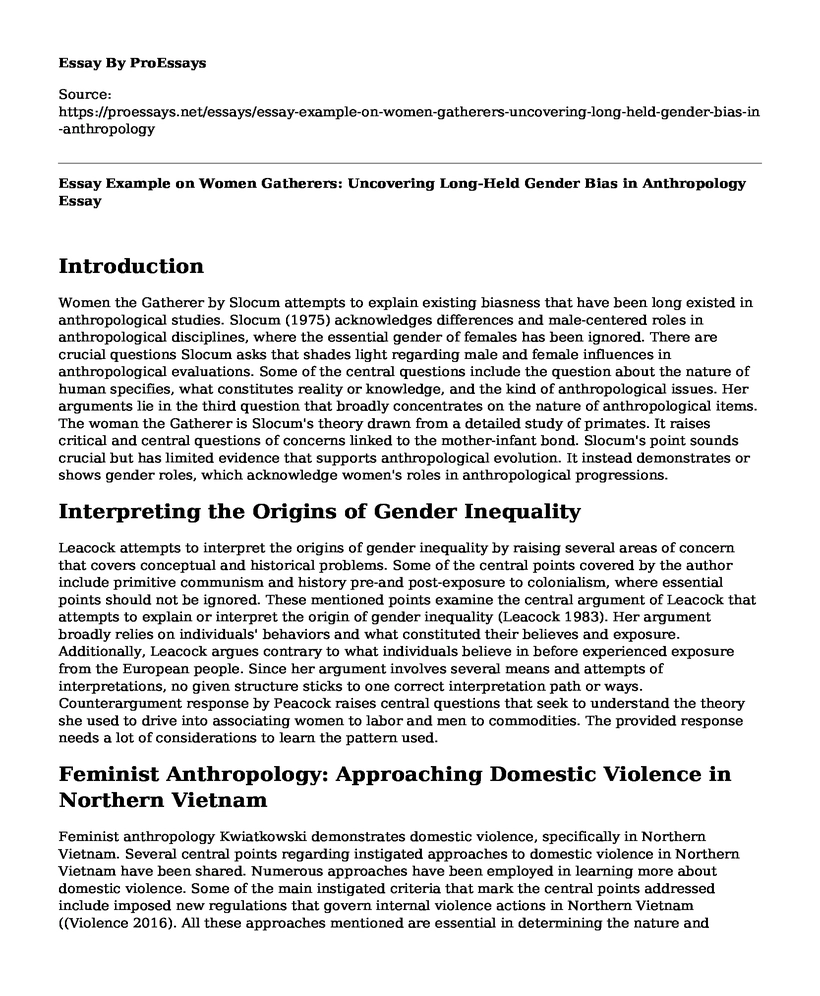Introduction
Women the Gatherer by Slocum attempts to explain existing biasness that have been long existed in anthropological studies. Slocum (1975) acknowledges differences and male-centered roles in anthropological disciplines, where the essential gender of females has been ignored. There are crucial questions Slocum asks that shades light regarding male and female influences in anthropological evaluations. Some of the central questions include the question about the nature of human specifies, what constitutes reality or knowledge, and the kind of anthropological issues. Her arguments lie in the third question that broadly concentrates on the nature of anthropological items. The woman the Gatherer is Slocum's theory drawn from a detailed study of primates. It raises critical and central questions of concerns linked to the mother-infant bond. Slocum's point sounds crucial but has limited evidence that supports anthropological evolution. It instead demonstrates or shows gender roles, which acknowledge women's roles in anthropological progressions.
Interpreting the Origins of Gender Inequality
Leacock attempts to interpret the origins of gender inequality by raising several areas of concern that covers conceptual and historical problems. Some of the central points covered by the author include primitive communism and history pre-and post-exposure to colonialism, where essential points should not be ignored. These mentioned points examine the central argument of Leacock that attempts to explain or interpret the origin of gender inequality (Leacock 1983). Her argument broadly relies on individuals' behaviors and what constituted their believes and exposure. Additionally, Leacock argues contrary to what individuals believe in before experienced exposure from the European people. Since her argument involves several means and attempts of interpretations, no given structure sticks to one correct interpretation path or ways. Counterargument response by Peacock raises central questions that seek to understand the theory she used to drive into associating women to labor and men to commodities. The provided response needs a lot of considerations to learn the pattern used.
Feminist Anthropology: Approaching Domestic Violence in Northern Vietnam
Feminist anthropology Kwiatkowski demonstrates domestic violence, specifically in Northern Vietnam. Several central points regarding instigated approaches to domestic violence in Northern Vietnam have been shared. Numerous approaches have been employed in learning more about domestic violence. Some of the main instigated criteria that mark the central points addressed include imposed new regulations that govern internal violence actions in Northern Vietnam ((Violence 2016). All these approaches mentioned are essential in determining the nature and attempts of domestic violence, but questions about the practice still exist. To learn more about domestic violence, corporate and related bodies should have to learn the two sides of the situation and identify central issues that lead to such cases of domestic violence in Northern Vietnam (Violence 2016). Of course, it is against humanity to incline to any form of domestic violence that women, in most cases, turns out the victims, but situations need to be learned from the two sides to find a practical solution.
The Emergence of Political Homophobia in Indonesia
The emergence of political homophobia in Indonesia addressed shares crucial areas of concerns such as homophobia and heterosexism, masculinity and the nation, homophobia as thuggery, and endangering violence, among others, where the emergence of political homophobia in Indonesia is learned. Within the article, several series of violence have been addressed and examined as essential areas of concern. The author shares a different view regarding the public perception of Indonesia's heterosexism and homophobia (Boellstorff 2014). The author disagrees with the fact that Indonesia has been perceived as a tolerant country to homosexuality. The same point explains why there is a point of masculinity and national belonging in Indonesia. Political homophobia is created from the public's reaction to homosexuality and a series of violent acts against gays in Indonesia (Boellstorff 2014). If violence against gays is perceived as the suitably masculine, does such response increases likeness of the action or reduces? Several considerations have to be taken to ensure an accurate outcome.
References
Boellstorff, T. (2004). The emergence of political homophobia in Indonesia: Masculinity and national belonging. Ethnos, 69(4), 465-486. https://escholarship.org/content/qt3k89m64b/qt3k89m64b.pdf
Dahlberg, F. (Ed.). (1981). Woman the gatherer. Yale University Press. https://philpapers.org/rec/SLOWTG
Leacock, E. (1983). Interpreting the origins of gender inequality: Conceptual and historical problems. Dialectical Anthropology, 7(4), 263-284. https://link.springer.com/article/10.1007/bf00249543
Violence, A. D. (2016). FEMINIST ANTHROPOLOGY. Mapping Feminist Anthropology in the Twenty-First Century, 234. https://books.google.co.ke/books?hl=en&lr=&id=8V9ODAAAQBAJ&oi=fnd&pg=PA234&dq=Feminist+Anthropology:+Approaching+Domestic+Violence+in+Northern+Vietnam&ots=sP7UU0n4E5&sig=jiKPFo1bja_JL9B8ZSPKLb8wcQQ&redir_esc=y#v=onepage&q&f=false
Cite this page
Essay Example on Women Gatherers: Uncovering Long-Held Gender Bias in Anthropology. (2023, Aug 29). Retrieved from https://proessays.net/essays/essay-example-on-women-gatherers-uncovering-long-held-gender-bias-in-anthropology
If you are the original author of this essay and no longer wish to have it published on the ProEssays website, please click below to request its removal:
- Essay Sample: Population on Earth, Carrying Capacity, Birth Rate, Death Rate
- Women in Organizations: The Glass Ceiling Essay Example
- Homelessness in New York City Paper Example
- Theme of Terrorism - Essay Sample
- Essay Example on Domestic Violence: Know the Extent & Impact
- Islamic Feminism: Challenges & Possibilities for Women's Equality - Research Paper
- Confirmation Bias: Strengthening Beliefs and Affecting Lives - Essay Sample







